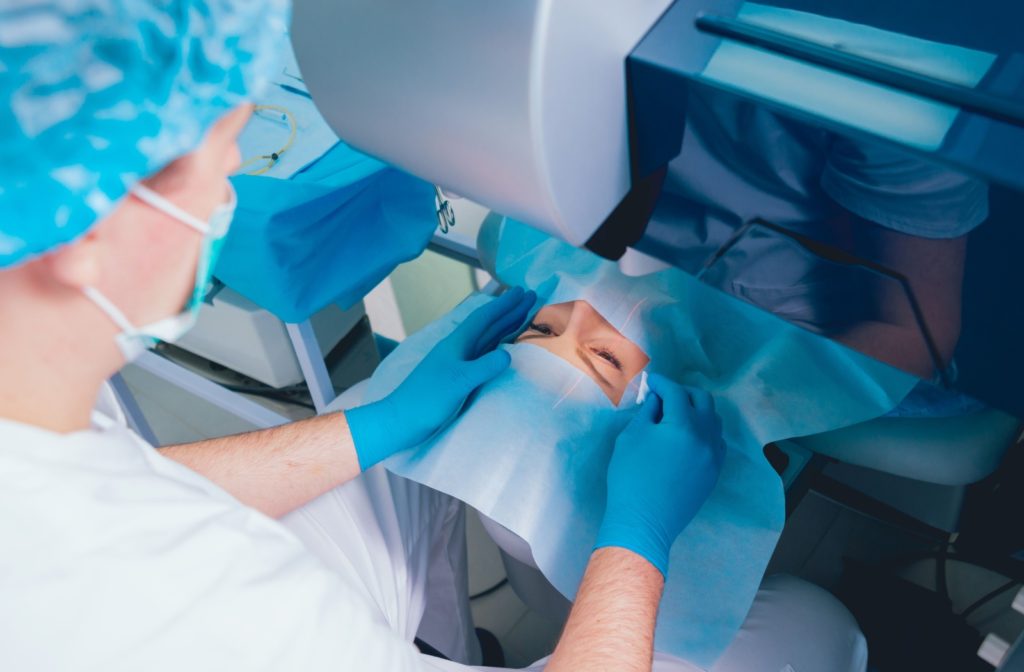Imagine waking up every morning and seeing the world clearly without reaching for your glasses or contact lenses. Laser eye surgery can make this dream a reality for many people, but it’s not a one-size-fits-all treatment. Being eligible for laser eye surgery carries some requirements. 18 is typically the youngest age for laser eye surgery, but many doctors recommend waiting in the early to mid-20s for your prescription to stabilize.
The following content should give you a good understanding of the laser eye surgery requirements. But ultimately your eye doctor can provide tailored information on your unique situation after performing a comprehensive eye examination.
Understanding Laser Eye Surgery
LASIK (Laser-Assisted In Situ Keratomileusis) is the most common form of refractive laser eye surgery. It’s designed to correct vision problems like nearsightedness, farsightedness, and astigmatism. The surgery reshapes the cornea, allowing light to enter the eye correctly and resulting in clearer vision.
A laser is used to create a thin flap in the cornea. This flap is lifted, and another laser reshapes the underlying corneal tissue. Once the reshaping is complete, the flap is laid back in place, where it heals naturally without needing stitches. The entire process is quick, typically taking less than 30 minutes with minimal risk for complications.
Laser eye surgery has become safer and more effective over the years, thanks to technological advancements. It’s essential to understand how the procedure works to determine if it’s the right choice for you.
Age Criteria for Laser Eye Surgery
The minimum age for LASIK is generally 18. This is because the eyes should fully mature and stabilize before the procedure. Vision can change significantly during childhood and adolescence, so waiting until adulthood helps ensure more stable results.
While 18 is the minimum age, many experts recommend waiting until your mid-20s to undergo the surgery. By this age, your prescription is more likely to have stabilized, reducing the risk of needing further corrections later.
Upper Age Limit for Laser Eye Surgery
There isn’t a strict upper age limit for LASIK, but older adults may face additional considerations. For instance, age-related eye conditions like cataracts or glaucoma could affect eligibility. It’s crucial to have a thorough eye examination to determine if laser eye surgery is suitable for your specific situation.
Factors Affecting Eligibility
Several factors aside from age can affect one’s eligibility for refractive laser eye surgery.
Eye Health
Healthy eyes are a prerequisite for laser eye surgery. Conditions like dry eye syndrome, keratoconus, or severe eye infections can disqualify a candidate. Addressing any underlying eye health issues before considering the procedure is essential. Because of the nature of LASIK, it’s also critical that a person has thick enough corneas.
Prescription Stability
A stable prescription for at least 12 months is crucial for successful LASIK. Frequent changes in your prescription indicate that your vision hasn’t settled yet, which could compromise the long-term effectiveness of the surgery.
Pregnancy & Breastfeeding
Hormonal changes during pregnancy and breastfeeding can affect vision. Therefore, it’s advisable to wait until after pregnancy and breastfeeding before undergoing laser eye surgery. This ensures that your vision has returned to its baseline state.

Benefits of Laser Eye Surgery
Laser eye surgery offers numerous benefits, including:
- Improved vision: Many patients achieve 20/20 vision or better.
- Convenience: No more glasses or contact lenses.
- Quick recovery: Many people return to normal activities within a day or two.
Potential Risks & Complications
While considered a safe and effective procedure, there are always potential risks with any procedure. But it’s important to discuss these with your eye doctor as they can offer you tailored advice to your situation. The risk of LASIK complications is less than 1%, so there is very little to be concerned about when following the advice of your eye care professional.
- Dry eyes: Some patients experience dry eyes after surgery, which usually resolves over time.
- Glare and halos: Night vision issues like glare and halos can occur, particularly in low-light conditions.
- Double or blurry vision: The procedure may cause blurriness in some individuals’ vision.
It’s important to note that these complications typically resolve on their own within a few days of the procedure for most people.
Timing Considerations
Choosing the right time for laser eye surgery is crucial. Factors like career demands, life events, and financial readiness should all be considered. Talking to an eye care professional can help you determine the best timing for your situation.
Discuss Your Options with Your Eye Doctor
Laser eye surgery can be life-changing, offering clear vision and freedom from glasses or contact lenses. Understanding the ideal age for LASIK and other eligibility factors can help you make an informed decision. Whether you’re 18 or 45, consulting with an eye care professional is the first step toward a brighter, clearer future.
Call our team at Total Vision Solana Beach today if you’re ready to explore laser eye surgery further. Your vision deserves the best care, and with the correct information, you can make a choice that enhances your quality of life.



